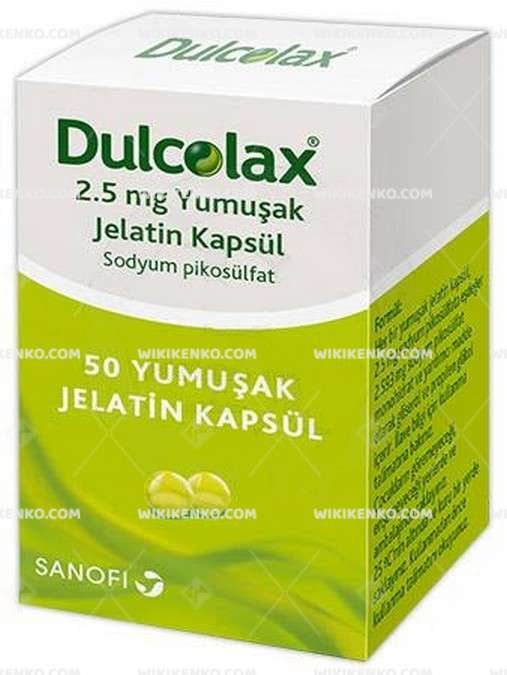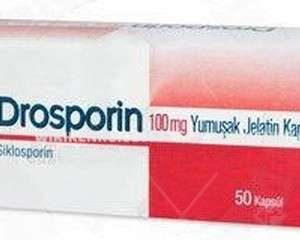Dulcolax Soft Gelatin Capsule
The “Dulcolax Soft Gelatin Capsule” stands as a beacon in the realm of constipation relief, housing Sodium Picosulphate as its active ingredient. Each soft gelatin capsule encapsulates 2.5930 mg of Sodium Picosulphate Monohydrate, translating to 2.5 mg of Sodium Picosulphate.
| Dosage form | |
|---|---|
| Pack size | |
| Potency | 2.5 Mg |
| Manufacturer | |
| Origin | |
| Generic Name (Ingredient) | Each Soft Gelatin Capsule; 2.5930 Mg Of Sodium Picosulphate Monohydrate Equivalent To 2.5 Mg Of Sodium Picosulfate. |
Assuming your emergency circumstances for this product, visit Urgent Quotation page. Besides, for any pharmaceutical questions, please ask us in the comments section.
Description
Sodium Picosulphate?
Sodium Picosulphate, classified as a stimulant laxative, orchestrates the movement of waste through the bowels. Its action typically materializes within 6-12 hours, making it an effective solution for constipation in adults and children aged 12 years and over.
How Long for Dulcolax to Work?
Dulcolax, fueled by Sodium Picosulphate, prompts action within 6-12 hours. Individual variations may influence the precise timing. Adherence to healthcare provider or medication package instructions is paramount. Consultation with a healthcare professional is advised if concerns arise or if the expected effects are not realized.
Side Effects
Dulcolax, featuring bisacodyl as its active ingredient, may usher in a spectrum of side effects, encompassing:
- Abdominal Discomfort: Including pain, cramps, and stomach discomfort.
- Nausea and Vomiting: Some individuals may experience nausea or vomiting.
- Diarrhea: A common side effect with potential for electrolyte loss, notably potassium.
- Faintness: Occasional reports of feeling faint after consumption.
- Rectal Burning: More prevalent with rectal forms but possible with oral intake.
- Less Common Side Effects: Dizziness and syncope (temporary loss of consciousness due to a fall in blood pressure).
This list is not exhaustive, and individual experiences may vary. Vigilance and consultation with healthcare providers are advised.
Recommended Dosage
The recommended Dulcolax dosage hinges on age:
- Adults and Children over 12 Years: One to three tablets daily, swallowed whole. Effects typically manifest in 6-12 hours. Optimal administration is 30 to 60 minutes before bedtime for a morning bowel movement.
- Children 6 to under 12 Years: One tablet in a single daily dose.
Dulcolax is earmarked for short-term use, and persistent symptoms necessitate medical advice.
Can Dulcolax Coexist with Other Medications?
Yes, but with caution:
- Electrolyte imbalance risk with diuretics and adrenocorticoids.
- Increased sensitivity to cardiac glycosides.
- Potential enhancement of gastrointestinal side effects with other laxatives.
- Interaction with medications reducing stomach acid, such as H2 blockers and proton pump inhibitors.
Healthcare provider consultation is crucial to ascertain comprehensive interaction details.
Benefits
Dulcolax Soft Gelatin Capsule, fueled by Sodium Picosulphate, offers:
- Relief from Constipation: Encourages bowel movement by facilitating waste transit.
- Predictable Results: Typically effective within 6-12 hours.
- Ease of Use: The soft gelatin capsule form enhances ease of ingestion.
Precision in adherence to healthcare provider directives is paramount. Persistent or worsening symptoms warrant medical attention.
Precautions
Several precautions are integral to Dulcolax Soft Gelatin Capsule usage:
- Healthcare Provider Consultation: Essential before commencing new medication.
- Short-term Use: Reserved for short-term relief; persistent symptoms mandate healthcare provider consultation.
- Pregnancy and Breastfeeding: Consult healthcare providers if pregnant, planning pregnancy, or breastfeeding.
- Children: Administration to children per healthcare professional guidance.
- Side Effects Awareness: Vigilance regarding potential side effects, including abdominal discomfort, nausea, and diarrhea.
- Medication Interactions: Full disclosure to healthcare providers about ongoing medications.
Adherence to these precautions is crucial for safe and effective use.
Interactions
Dulcolax Soft Gelatin Capsule, housing Sodium Picosulphate, may interact with various medications:
- Diuretics and Adrenocorticoids: Elevated risk of electrolyte imbalance.
- Cardiac Glycosides: Increased sensitivity potential.
- Other Laxatives: Possible enhancement of gastrointestinal side effects.
- Medications Reducing Stomach Acid: Interaction with H2 blockers and proton pump inhibitors.
Healthcare providers should be informed of all ongoing medications for a comprehensive interaction assessment.
Conclusion
In conclusion, the Dulcolax Soft Gelatin Capsule, fortified with Sodium Picosulphate, emerges as a reliable ally in the battle against constipation. While its benefits are substantial, meticulous adherence to dosage, precautions, and awareness of potential interactions are imperative. A collaborative approach with healthcare professionals ensures optimal outcomes, establishing Dulcolax as a cornerstone in constipation management.
Overview
| Aspect | Information |
|---|---|
| Active Ingredient | Sodium Picosulphate |
| Dosage Form | Soft Gelatin Capsule |
| Dosage | Adults and Children over 12 Years: 1-3 tablets daily. Children 6 to under 12 Years: 1 tablet daily. |
| Timing of Effect | 6-12 hours, with individual variations. |
| Short-term Use | Recommended, with persistent symptoms requiring medical advice. |
| Pregnancy and Breastfeeding Consultation | Essential before use. |
| Side Effects Awareness | Abdominal discomfort, nausea, diarrhea, faintness, rectal burning, and others. |
| Medication Interactions | Diuretics, adrenocorticoids, cardiac glycosides, other laxatives, medications reducing stomach acid, and others. |
This comprehensive exploration provides a roadmap for users and healthcare professionals, ensuring informed and safe utilization of the Dulcolax Soft Gelatin Capsule.
1 review for Dulcolax Soft Gelatin Capsule
Use the form below to report an error
Please answer the questions as thoroughly and accurately as possible. Your answers will help us better understand what kind of mistakes happen, why and where they happen, and in the end the purpose is to build a better archive to guide researchers and professionals around the world.
The information on this page is not intended to be a substitute for professional medical advice, diagnosis, or treatment. always seek the advice for your physician or another qualified health provider with any questions you may have regarding a medical condition. Always remember to
- Ask your own doctor for medical advice.
- Names, brands, and dosage may differ between countries.
- When not feeling well, or experiencing side effects always contact your own doctor.
Cyberchondria
The truth is that when we’re sick, or worried about getting sick, the internet won’t help.
According to Wikipedia, cyberchondria is a mental disorder consisting in the desire to independently make a diagnosis based on the symptoms of diseases described on Internet sites.
Why you can't look for symptoms on the Internet
If diagnoses could be made simply from a textbook or an article on a website, we would all be doctors and treat ourselves. Nothing can replace the experience and knowledge of specially trained people. As in any field, in medicine there are unscrupulous specialists, differences of opinion, inaccurate diagnoses and incorrect test results.





Şule Terzioğlu Uşak –
What is the origin of gelatin in Dulcolax? Beef? Pork?
Medical Guidance Center –
Hello Şule Terzioğlu Uşak, this is WikiKenko.
The gelatin usually used in capsules comes from either beef or pork sources. However, the source of the gelatin used in Dulcolax Soft Gelatin Capsules is unclear from the information available. To obtain precise information, it would be advisable to contact the manufacturer directly or refer to the product’s packaging or supporting documentation. It’s worth noting that some manufacturers certify their gelatin types as Halal and Kosher to cater to different consumer demands and preferences.